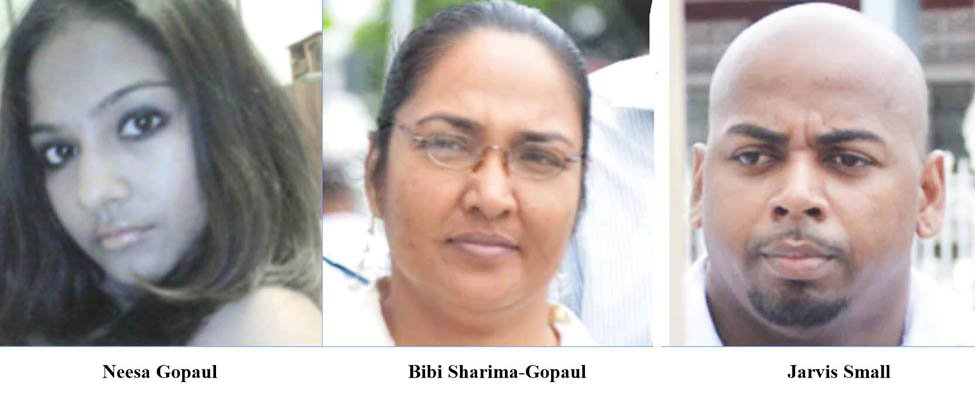Aggrieved like his co-convict Bibi Sharima-Gopaul who was convicted and sentenced for the murder of her daughter; Jarvis Small has also lodged an appeal with the Caribbean Court of Justice (CCJ), in which he contends he should never have been tried with the woman.
Small who once shared a relationship with Gopaul, cited the issue of prejudice and argues that the Guyana Court of Appeal erred in finding that there was no prejudice to him being jointly-charged with her.
In his appeal to the CCJ, Small is asking the Trinidad-based court of last resort to quash his conviction and sentence.
Back in 2015, he and Gopaul were both found guilty by a jury for the gruesome murder of her 16-year-old daughter—former Queen’s College student—Neesa Gopaul whose battered decomposing remains were found on October 2nd, 2010, stuffed in a suitcase that was dumped in a creek at the Emerald Tower resort.
Trial Judge Navindra Singh had sentenced Sharima-Gopaul to 106 years in jail, and Small, to 96 years. They would subsequently appeal their convictions and sentences.
Last August, the local appellate court upheld the convictions, but reduced both their sentences to 45 years each.
Small in his notice of appeal before the CCJ argues that the local appellate court did not only err in finding that the trial judge was right to have him tried him with Gopaul; but also in its finding that the trial judge had given proper and adequate directions to the jury on how to assess the evidence of each accused.
Small (the Appellant) is also of the view that Justice Singh incorrectly overruled a no-case submission his attorney had made, and argues that the Court of Appeal erred in finding otherwise.
Another ground on which Small is appealing is that the appeal court erred in its finding that the trial judge had properly and correctly admitted “background evidence” of reports the now-dead teen had made against him to the police.
The Appellant’s contention is that the “prejudicial effect” of such evidence was neither relevant nor admissible and outweighed its probative value; while adding that the Court of Appeal had erred in not so finding.
Through his attorney Nigel Hughes, Small has also advanced that Justice Singh failed to adequately put his defence to the jury.
Another finding of the Court of Appeal which Small is challenging notes that though it found Justice Singh’s directions to the jury inadequate on certain aspects of the evidence led by the prosecution, it had not resulted in a substantial miscarriage of justice, on a finding that the jury would have arrived at the same verdict.
Small has expressed the view that the variation of the sentence by the local appellate court to 45 years was “manifestly excessive.”
Among other things, Sharima-Gopaul in her appeal before the CCJ also complains of her High Court trial having prejudicial evidence led against her which she says ultimately resulted in a miscarriage of justice.
She wants the court of last resort to reverse and/or set aside the judgment of the Guyana Court of Appeal which upheld her conviction. At the trial, the High Court had heard that Neesa had made several police reports of Small sexually assaulting her.
Pathologist Dr. Nehaul Singh, who performed the autopsy on the teen’s body, had testified that she was missing 50% of her head and that the multiple blunt trauma that caused her death had been forcefully inflicted.
She was said to have been clobbered to the extent that her head appeared bashed in.
Neesa’s killing had sparked protests from several non-governmental organisations which had said that the “system had failed her.”
Main prosecution witness Simone Diane De Nobrega, who was a former cellmate of Sharima-Gopaul, said Sharima-Gopaul had confided in her that it was Small who murdered her daughter by bashing her head in with a piece of wood.
De Nobrega had said that Sharima-Gopaul related to her that Small told her that they needed to get Neesa “out of the picture” and that he eventually killed the teen in her presence.
The witness had told the court that despite her assurance to Sharima-Gopaul, she would not have been able to live with herself if she had kept such a secret. She said as a mother herself of two sons, “I couldn’t carry such a weight.” The woman added, “Neesa deserved to get justice and no matter what, Neesa didn’t deserve to die by the hands of someone she trusted; someone that was supposed to protect her.”






